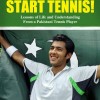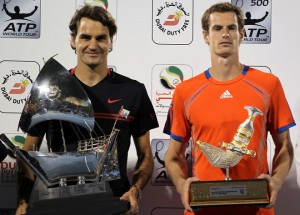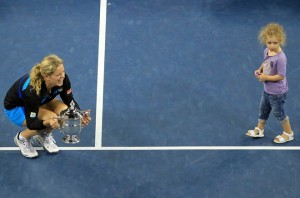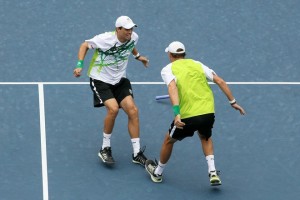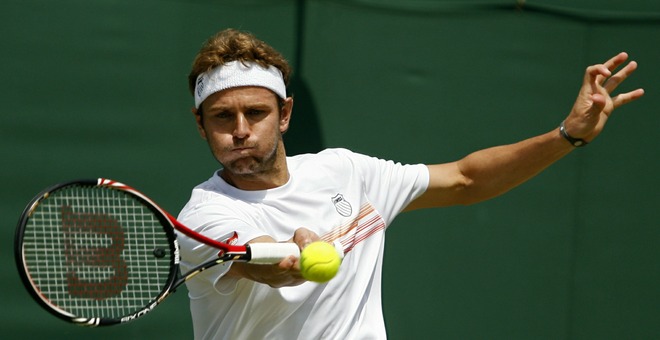The greatest humanitarian tennis has ever known was Arthur Ashe. In current times, this title may be bestowed to Aisam Ul-Haq Qureshi, a doubles specialist from Pakistan who is a two-time winner of the ATP World Tour’s “Arthur Ashe Humanitarian Award.”
Qureshi first gained international recognition when as a Muslim from Pakistan, he partnered with Amir Hadad, a Jew from Israel, at Wimbledon and the US Open in 2002. Their partnership received much international media attention and their photo appeared as the lead, above-the-fold image on the front page of The New York Times during the US Open, where they reached the third round. He was also placed in the spotlight in 2010 when he partnered and reached the US Open doubles final with Rohan Bopanna, a leading player from India, a nation with political differences with that of Qureshi’s Pakistan. Shortly after his US Open success (he also reached the mixed doubles final) Qureshi founded his non-profit foundation (www.StopWarStartTennis.org), created with the purpose of bringing hope through tennis to all those affected by war, sectarian conflict and landmines/unexploded ordinance.
Qureshi has taken the name of his “Stop War, Start Tennis” foundation and placed it as the name of his ebook “Stop War, Start Tennis! Lessons of Life and Understanding From a Pakistani Tennis Player” where he shares inspiring stories based on his life experiences. The book, available for $4.99 here: http://m1e.net/c?83116886-4HPysGd.OPk1s%408047560-e1PaGSwUou3Y2, features a chapter called “Understand and Fight Prejudice” which is excerpted here below.
Understand and Fight Prejudice
By attempting to set a good example, I have shown how peace, friendship and tolerance through sport can offer its participants the opportunity to mix with athletes of different cultures and religions.
It was never my intention to make any political statements by playing with Rohan Bopanna or with the Israeli player Amir Hadad. It just happened. With Amir we were just trying to get into the qualifying tournament at Wimbledon in 2002, and on and off the court we got along fine. Honestly, the whole Jewish and Muslim, Israeli and Pakistani slant never entered my mind. I just saw Amir for what he was; a good person and a good tennis player who I thought would make a good teammate. Then it took off in the media. As we started winning matches throughout the summer, the press kept writing about us and one morning we woke up and on the front page – above the fold – there was a photo of us in the New York Times. The fact that it made such worldwide news was a great lesson to me on how people’s perceptions and prejudices can limit them. Overall, the reaction was positive, but there were certainly those who saw it as a bad thing. I realized that for many, their minds were closed, but some understood and actually, saw it for what it really was – sport. Amir and I discussed it a lot and agreed that sports and politics should not be mixed together. It was an incredible experience that opened my eyes to the dangers of prejudice.
“When Aisam and I finished practising before Wimbledon, he asked me if I wanted to play doubles with him,” Hadad said. “When I said yes, I didn’t think that this pair-up would lead to the most interesting and successful year of my career. I was very happy to be a part of this team that was very successful. I shared with Aisam great moments. When we ended up on the front page of the New York Times, we knew we were doing something great together.”
For this unlikely pairing, we received the ATP’s Arthur Ashe Humanitarian Award and were nominated for an Award for Moral Courage by the Anne Frank House, a multi-faith, educational charity in London.
In the very beginning of our early days on the ITF circuit, Rohan and I had a certain chemistry. Off the court, we seemed to click. In 2003, Rohan and I won our first title, an ATP Challenger Tour event in Denver, Colorado in the United States. And we always felt that we could be a great team together. We would play together whenever we could but at times our individual rankings were not high enough to get us into the tournament, so we had to play with other players.
In 2010, when the world’s media became increasingly interested in our partnership and what it might mean for relations between India and Pakistan, I began thinking seriously about my role and what I could do to help the cause. Though India and Pakistan are now two nations, it was not always so, and we are more united by our similarities than divided by our differences.
Just as I am proud to be a Pakistani, and proud to be a Muslim, I know Rohan is proud to be Indian and a Hindu. I respect him for that and appreciate that he respects my beliefs as well and it has never ever come between us. I was raised and educated by my family to respect all people and all religions. Extremists exist in all societies, but the root of the problem can be traced to poverty and lack of education. Specifically, a lack of understanding other cultures and appreciating that we have the right to different beliefs and opinions.
Throughout my travels, I have experienced racial profiling and blatant discrimination. Honestly, it hurts. I decided early on not to let those people who were second-guessing me or accusing me of dishonesty, get the better of me by losing my temper. I remember back in 2003, when I arrived at JFK Airport in New York, and instantly I was escorted to the secondary screening room for more questions. The officer in charge asked me to give my finger prints, eye scan and take an oath. I told him that I had already done this process the year before. He said that there was no record of my having done it and accused me of lying and trying to deceive him. I was shocked, and even more surprised to see how angry he became towards me. He said, “One of us is lying. And it is not me.” So, I held my tongue and let him carry on with the process.
On another visit that year, Robert Davis and I had just landed at Dulles Airport in Washington D.C. and after the flight, Robert went straight through. I went through Immigration. Hours passed. Two, three, four and finally five hours later, I emerged completely unsettled by the intense questioning and rude treatment by the officials. Obviously, we missed our connecting flight and as we were walking down the terminal, I remember telling Robert “They had their minds made up already and would not listen. No matter how much information I gave them, they would not look at it logically. It is like they consider everyone from Pakistan a terrorist.”
Wherever we went on the tennis tour, people asked us where we were from. Whenever I said ‘Pakistan,’ you could see the reaction was one of apprehension. Once when we went to the Mexican Consulate to request a visa for Mexico, they asked me for my passport. When I gave them the green passport of Pakistan, the Vice Consul passed it back and laughed.
“No chance,” he said to me. “No chance at all.” You would not think so, but the tennis tour can often get lonely. However, there is one thing that most of the players like to do and that is go out to a local club where there is loud music and dancing. It helps to take your mind off the highs and lows of weekly results. All over the world, identification is required, and the most common form is a driver’s license or passport. Once I was in Germany and I was going out with Tomas Bendarek of Poland and Dustin Brown of Jamaica. Bendarek was dressed in trainers and the bouncers let him in – no problem. Dustin and I were dressed up more, but they would not let us in. I could not believe it. And then I heard the guy say to Dustin that not even US President (Barack) Obama would get in. I was really upset because of our color we were not allowed into the club. A similar thing happened in Bordeaux, France with Rohan and I. The guy would not let us in. Then when the manager realized we were tennis players in town for the tournament, we were let in. Another time in the state of South Carolina in the United States, I was training at Clemson University and on the weekend I wanted to join the rest of the guys at college hangout called Tiger Town. I handed the security my passport, he studied it carefully, and said, “No admittance.” He said that because my passport was handwritten in the opening pages, it could have easily been forged and that he could not allow me to enter with the others.
At the 2011 US Open, all the players and coaches were offered a special visa service by the ATP for the Masters Series event in Shanghai. What we had to do was fill out several forms, submit photos and submit everything to the tour manager in charge. Then a few days later we could collect our visas for China. There were about fifty plus players and coaches who applied. Three days later, everyone received passports back with the Chinese visas, except me. Even though I have had multiple visas to China over the years, I was told that I must apply back in Pakistan.
I have always felt the best way I can change their negative opinions about Pakistan is to set a good example. “I observed so many instances like that travelling with Aisam over the years,” said Davis. “But to his credit he never lost his temper or gave any reason to those people who were discriminating against him to think negatively of him or his country.”
“Sport’s greatest victory is not measured in terms of medals. It is measured by its ability to positively change people’s lives and mentalities and bring them hope,” said Joel Bouzou, President and Founder of Peace and Sport Foundation. “That’s exactly what Aisam-Ul-Haq Qureshi has succeeded in doing through his fierce advocacy for peace, friendship and tolerance.”
